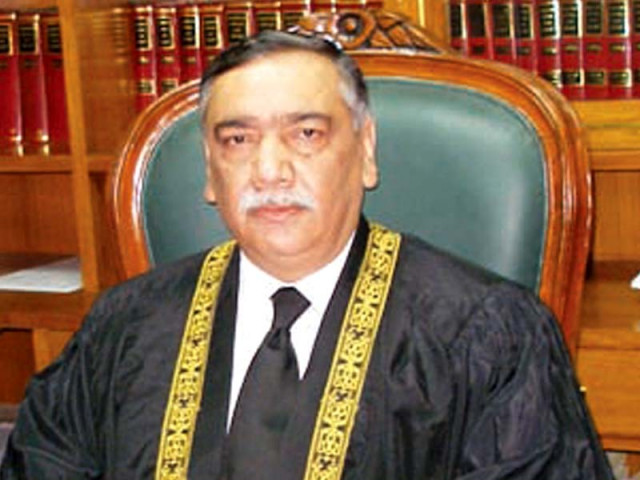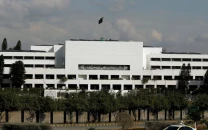Judicial reforms advance but many concerns go unattended
Senior lawyers believe CJP should take notice of human rights violations in the name of accountability by NAB and govt

Justice Asif Saeed Khosa. PHOTO: EXPRESS
Two major political parties Pakistan Muslim League – Nawaz (PML-N) and Pakistan Peoples Party (PPP) are raising their voice over alleged selective accountability of pick and choose.
On the other hand, the superior judiciary and executive are on same page on several issues especially accountability procedure, judicial appointments and others during tenure of incumbent CJP. Unlike recent past, there is no judicial activism, which may irk Pakistan Tehreek-e-Insaf (PTI)-led government.
However, in the past, both PML-N and PPP faced tough time by the superior judiciary since its restoration in March 2009. Due to judicial activism, executive and legislature suffered and civilian supremacy was also affected.
Judicial reforms for a competitive Pakistan
Talking about challenges of incumbent judiciary, a senior lawyer believes that credibility deficit and depolarization is the biggest challenge.
"Right now judiciary is seen in one camp. It should not polarize but also it should be bipartisan," he said.
Renowned lawyer Faisal Siddiqui talks about balancing of judicial reforms and threats to democracy, human rights and judicial independence.
"CJP Khosa successfully concentrated on the former threats but sadly ignored the latter," he further said.
Another lawyer believes that independence of judiciary is being compromised by alleged manipulation of judicial proceeding by executive authorities.
He said that the law ministry stopped special court CNS judge from judicial work in Rana Sanaullah case. Another judicial officer granted 14 days remand to senior journalist Irfan Siddiqui. On the next day, same judge granted him bail. Unlike Islamabad High Court registrar recommendation, the ministry did not repatriate the service of accountability court judge Arshad Malik.
The PML-N leaders are also levelling allegations against the judiciary saying the trial of former premier Nawaz Sharif had been manipulated. Same allegations were leveled by ex-high court judge but these could not be probed. Even, All Pakistan Lawyers Convention on Saturday urged the superior judiciary to not "act on the desires of other institutions".
Legal experts appreciate CJP Khosa for not interfering in the executive polices especially, financial affairs. Even no parliamentarian has been disqualified by the apex court directly during his tenure.
CJP reviews reforms in judiciary
However, senior lawyers believe that the chief justice should take notice of human rights violations in the name of accountability by National Accountability Bureau and PTI-led government. Several opposition leaders have been put behind bars during the investigation.
Media persons are irked over the curtailing of freedom of speech and imposition of censorship in the country.
Though, the superior judiciary monitored the trial of politicians in graft cases, but treason trial of former president Pervez Musharraf could not be completed since November 2013.
Even CJP Asif Saeed Khosa in his first address on January 17 proposed an inter-institutional dialogue at summit-level to be convened by President of Pakistan and attended by the top parliamentary leadership, judicial leadership and executives including the military and intelligence agencies.
He had admitted that in the recent past that there had been a trust deficit between different organs of the State and every organ had a reason for sticking to its declared position.
"I would, therefore, with the approval and support of my colleagues, propose holding of an inter-institutional dialogue at the summit level and would request the worthy President of Pakistan to convene a meeting and to chair the deliberations. I am of the opinion that we have reached a stage in our national life where we must take stock of the mistakes committed in the past and to come up with a Charter of Governance so as to ensure that such mistakes are not repeated in future. I would propose that such a summit may be attended by the top parliamentary leadership, the top judicial leadership and the top executive leadership including the military and the intelligence agencies. After bringing all such major stakeholders in the national governance on one table under the patronage of the President of Pakistan an effort should be made through such proposed exercise to heal the wounds of the past, attend to the sore points and work out a practicable policy framework where every organ and institution of the State exercises its powers and performs its functions within its constitutionally defined limits. The sole purpose of the proposed exercise should be to bolster constitutionalism and rule of law, strengthen democracy and create an environment wherein the state and all its organs and institutions may be able to devote their wholehearted attention to the real issues of the citizens of this great country and, as envisaged in the Preamble to our Constitution", said the CJP.
Despite passage of six months, the president of Pakistan could not convene proposed summit.
Legal experts believe that trust deficit, which was highlighted by incumbent CJP in his first speech, has increased and major parties lack faith on courts for justice.



















COMMENTS
Comments are moderated and generally will be posted if they are on-topic and not abusive.
For more information, please see our Comments FAQ